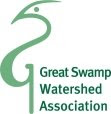Long Hill Township
In Long Hill, Restore Meyersville LLC has submitted an application to build a new indoor volleyball facility on property located at 596 Meyersville Road near the Meyersville traffic circle. The property, which once housed a business known as Archie's Resale, stands adjacent to a portion of the Great Swamp National Wildlife Refuge. GSWA has participated in several planning board meetings, and questioned the applicant and his experts. The site is contaminated with asbestos and polycyclic aromatic hydrocarbons (PAHs). Under the proposed development plan, these pollutants will be cleaned up under the oversight of a Licensed Site Remediation Professional (LSRP). The same plan will reduce the amount of impervious surface coverage at the site by almost 10%. In turn, this may lead to a reduction in the amount of stormwater runoff flowing away from the property which will benefit the local environment.
Bernardsville Borough
 |
| Proposed site for new TD Bank building off Morristown Road in Bernardsville, NJ. Credit: S. Reynolds |
Nearby Penns Brook has already suffered serious damage as a result of the stormwater runoff emanating from existing building complexes in the area. Erosion along the brook is extensive. Water testing reveals unusually high nitrate levels. Road salt is routinely detected at levels in excess of state water quality standards.
As proposals for new construction along this stretch of Morristown Road have proliferated, GSWA has stepped in repeatedly to represent environmental interests and protect Penns Brook from additional harm.
In 2006, the organization cited concerns over increased stormwater runoff and erosion in its opposition to Weichert Realtors’ plan to construct a new building next to its existing 62 Morristown Road location. (This construction project was proposed for the same site now under consideration by TD Bank.)
GSWA actively participated in the application for expansion of Bernardsville Centre to ensure appropriate stormwater controls. GSWA stepped in once again in 2012 when Chase Bank sought to build a new facility immediately south of 62 Morristown Road. In this case, the organization successfully argued in favor of amending Chase’s original development plan to include stricter stormwater controls.
 |
| Construction is currently underway at the Chase Bank site off of Morristown Road in Bernardsville, NJ. Credit: S. Reynolds |
Slope disturbances at the Chase Bank site have been extreme. The precipitous embankment that has been created has exposed several soil layers to the elements (see photos). Although a retaining wall is being constructed, this wall will not be as effective as a stabilized natural slope.
Should TD Bank’s new proposal proceed, more of the same slope is likely to disappear. And, yet another stand of mature, soil-stabilizing vegetation will disappear along with it. Without question, the addition of another building and another parking lot will add even more to the impervious surface cover in this already-crowded Morristown Road corridor.
We already know that erosion and stormwater pollution have taken their toll on Penns Brook. With new construction projects proliferating in the area--first at the Chase site and now at the proposed TD site--Penns Brook’s future must be weighed carefully against the upsides of further development. And while development may be inevitable, GSWA will vigilantly advocate for it to be appropriate in size, scope, and environmental protections.






